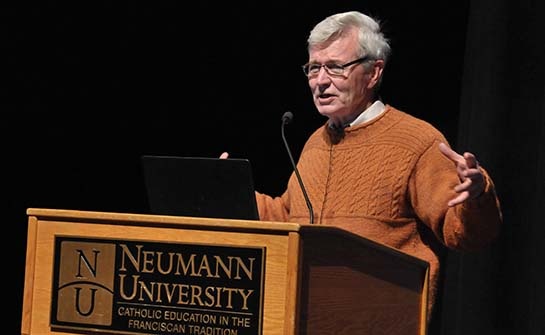
“I was advertised as a controversial speaker, and I aim to live up to that,” Dr. Bruce Alexander told his audience in the Meagher Theatre.
In his 90-minute presentation to more than 125 students and faculty, Dr. Alexander more than lived up to his billing.
“Drugs don’t cause addiction,” he said during his March 30 lecture entitled The Road from Rat Park. “Our problems are deeper than drugs, and we’ve used drugs as a smokescreen.”
In a soft-spoken and reasoned manner, he made his argument. First, he explained his famous Rat Park experiment in which he gave 60 rats doses of morphine over a long period of time to make them addicted to the drug. He then placed half of the rats in tiny Skinner boxes (one per cage) and the other half in a large, open area (rat park) where they could play and socialize. The rats in both environments were offered food, water and morphine. High numbers of the rats in cages kept taking morphine; in rat park, however, fewer and fewer of the rats kept taking the drug.
Alexander readily admits that the results of experiments with rats are not applicable to human beings, but the rat park phenomenon does indicate that the social environment seems to have an impact of the manifestation of addiction.
Next he cited a 2011 study, which found that people were addicted to a large variety of activities – shopping, pornography, eating and work, among others. The study does not diminish or trivialize the seriousness of drug addiction, but it does illustrate that addiction is a broad issue, not confined to an unhealthy dependency on the drug du jour, whether it be heroin, crack cocaine or opioids. If there were no drugs, there would still be addiction.
Finally, he referenced a study by the World Health Organization, which found that most people who use drugs recreationally do not become addicted.
So, if drugs don’t cause addiction, then what does? Alexander argues that the fragmentation of society (its emphasis on individualism and competition) causes widespread social and cultural dislocation. “Addiction,” he said, “is a way of adapting to dislocation.”
Is our society so fragmented that addiction of all kinds may become more common? According to Alexander, “The terrible mess of contemporary society” makes it difficult for large swaths of people to find stability. Witness the 900 people who died of overdoses last year in Philadelphia and the additional 900 overdose deaths in British Columbia, Alexander’s home Canadian province.
“Our social system,” he concludes, “is uninhabitable to many.”
Rather than accepting the common wisdom that “we have social problems because we have drugs,” Alexander believes that we have drug abuse because we have social problems.
Alexander has counseled hard-core heroin addicts, conducted psychopharmacological research, supervised field research on cocaine for the World Health Organization, and interviewed university students about their drug and process addictions.
He has published three books: Peaceful Measures: Canada’s Way Out of the War on Drugs (University of Toronto Press, 1990), The Globalization of Addiction: A Study in Poverty of the Spirit (Oxford University Press, 2008), and A History of Psychology in Western Civilization (Cambridge University Press, 2015, co-author Curt Shelton).
Since retiring from Simon Fraser University as Professor Emeritus in 2005, Bruce Alexander has lectured frequently in Canada and Europe. He was awarded the Sterling Prize for Controversy in 2007.
 CHALLENGE
CHALLENGE





